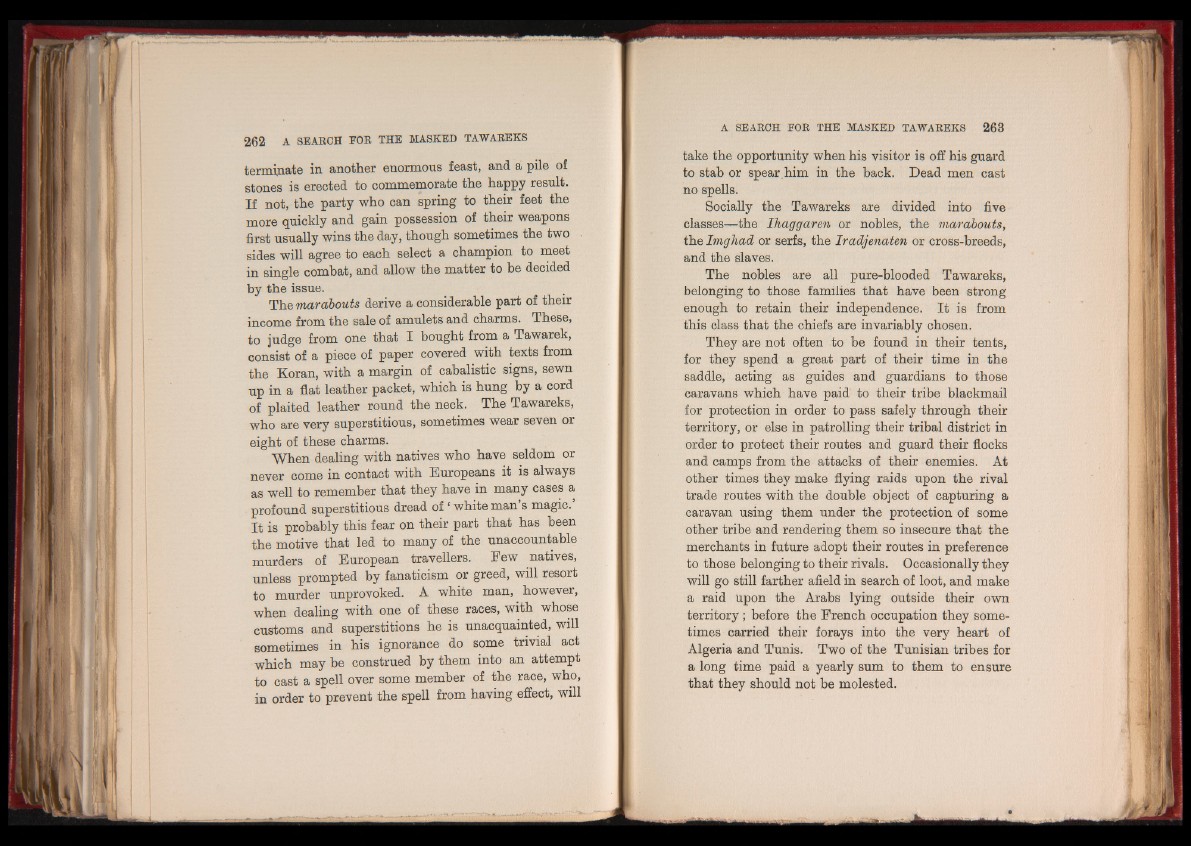
terminate in another enormous feast, and a pile of
stones is erected to commemorate the happy result.
If not, the party who can spring to their feet the
more quickly and gain possession of their weapons
first usually wins the day, though sometimes the two
sides will agree to each select a champion to meet
in single combat, and allow the matter to be decided
by the issue.
The marabouts derive a considerable part of their
income from the sale of amulets and charms. These,
to judge from one that I bought from a Tawarek,
consist of a piece of paper covered with texts from
the Koran, with a margin of cabalistic signs, sewn
up in a flat leather packet, which is hung by a cord
of plaited leather round the neck. The Tawareks,
who are very superstitious, sometimes wear seven or
eight of these charms.
When dealing with natives who have seldom or
never come in contact with Europeans it is always
as well to remember that they have in many cases a
profound superstitious dread of ‘whiteman s magic.
It is probably this fear on their part that has been
the motive that led to many of the unaccountable
murders of European travellers. Eew natives,
unless prompted by fanaticism or greed, will resort
to murder unprovoked. A white man, however,
when dealing with one of these races, with whose
customs and superstitions he is unacquainted, will
sometimes in his ignorance do some trivial act
which may be construed by them into an attempt
to cast a spell over some member of the race, who,
in order to prevent the spell from having effect, will
take the opportunity when his visitor is off his guard
to stab or spear, him in the back. Dead men cast
no spells.
Socially the Tawareks are divided into five
classes—the Ihaggaren or nobles, the marabouts,
the Imghad or serfs, the Iradjenaten or cross-breeds,
and the slaves.
The nobles are all pure-blooded Tawareks,
belonging to those families that have been strong
enough to retain their independence. It is from
this class that the chiefs are invariably chosen.
They are not often to be found in their tents,
for they spend a great part of their time in the
saddle, acting as guides and guardians to those
caravans which have paid to their tribe blackmail
for protection in order to pass safely through their
territory, or else in patrolling their tribal district in
order to protect their routes and guard their flocks
and camps from the attacks of their enemies. At
other times they make flying raids upon the rival
trade routes with the double object of capturing a
caravan using them under the protection of some
other tribe and rendering them so insecure that the
merchants in future adopt their routes in preference
to those belonging to their rivals. Occasionally they
will go still farther afield in search of loot, and make
a raid upon the Arabs lying outside their own
territory ; before the French occupation they sometimes
carried their forays into the very heart of
Algeria and Tunis. Two of the Tunisian tribes for
a long time paid a yearly sum to them to ensure
that they should not be molested.